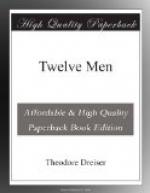Another day as we were riding along a road which led into a nearby city of, say, twenty thousand, we encountered a beer truck of great size and on its seat so large and ruddy and obese a German as one might go a long way and still not see. It was very hot. The German was drowsy and taking his time in the matter of driving. As we drew near, Culhane suddenly called a halt and, lining us up as was his rule, called to the horses of the brewery wagon, who also obeyed his lusty “Whoa!” The driver, from his high perch above, stared down on us with mingled curiosity and wonder.
“Now, here’s an illustration of what I mean,” Culhane began, apropos of nothing at all, “when I say that the word man ought to be modified or changed in some way so that when we use it we would mean something more definite than we mean now. That thing you see sitting up on that wagon-seat there—call that a man? And then call me one? Or a man like Charles A. Dana? Or a man like General Grant? Hell! Look at him! Look at his shape! Look at that stomach! You think a thing like that—call it a man if you want to—has any brains or that he’s really any better than a pig in a sty? If you turn a horse out to shift for himself he’ll eat just enough to keep in condition; same way with a dog, a cat or a bird. But let one of these things, that some people call a man, come along, give him a job and enough money or a chance to stuff himself, and see what happens. A thing like that connects himself with one end of a beer hose and then he thinks he’s all right. He gets enough guts to start a sausage factory, and then he blows up, I suppose, or rots. Think of it! And we call him a man—or some do!”
During this amazing and wholly unexpected harangue (I never saw him stop any one before), the heavy driver, who did not understand English very well, first gazed and then strained with his eyebrows, not being able quite to make out what it was all about. From the chuckling and laughter that finally set up in one place and another he began dimly to comprehend that he was being made fun of, used as an unsatisfactory jest of some kind. Finally his face clouded for a storm and his eyes blazed, the while his fat red cheeks grew redder. “Donnervetter!” he began gutturally to roar. “Schweine hunde! Hunds knoche! Nach der polizei soll man reufen!”
I for one pulled my horse cautiously back, as he cracked a great whip, and, charging savagely through us, drove on. Culhane, having made his unkind comments, gave orders for our orderly formation once more and calmly led us away.




